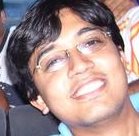"Only problem I have with Ayurved is that it is unscientific" , said a fellow blogger.
"Well, that depends on how you define science" , I retorted.
"Science isnt philosophy. It has one certain definition. There has to be experimentation, theory, equations, repeatable applicability involved in being scientific. A thing being useful is different from it being scientific. I use Ayurvedic medicine and Meditation myself. It is useful but it doesn't make it scientific."
"Can we say that it is a science that we don't understand?"
"No, it will be science if we make efforts, and detail fundamentals of it for our understanding".
"But science and the scientific equations and the math you are talking of is also based on assumptions. Aren't those assumptions what they call 'faith'?"
And the debate went on for more than an hour. But you got the crux, didn't you? Neither one of us might be completely right, nor would either one of be completely wrong.
Science in that case is has to be as Wikipedia says "Rationally explained and reliably applied". Well may be it makes it closer to what he was viewing science as. So that brings me to a point where I find science inadequate.
You can rationally explain something for which you understand the fundamentals. You can reliably apply it when you understand the application of these fundamentals. But then there are so many things in this world for which we do not really have an explanation. Philosophy comes in for help at all those places. It seems strange to think that Science and Philosophy weren't two different streams if we go back in time. Science is about eliminating options and creating certainty. Philosophy is about elucidating possibilities and creating prospects. Philosophy hence builds itself over observation and thoughts, and science over experimentation and "facts".
So what does it tell us? Well it tells us that if we rely only on science (and here comes an opinion) we will mostly have innovations but no discovery. I am saying that as discoveries are done by either exploring unknowns or hitting up on them by chance, while innovations are basically approached "rationally" and applied "reliably" by design. Think of it, what was the scientific basis of Copernicus to think that the world was round, or the thought that we are not the center of the universe? There was nothing in it from the explanation of science that we just discussed. There was something beyond it.
I might be taking it a little too far, but can that be the reason that century or so, we really did not have any "major" discoveries but have had a lot of innovation.
I want to read our ancient Indian scriptures / literature, whatever few things I have read has made me feel that thinking that we are human beings who are still evolving psychologically (biologically of course we are), might not be correct. One thing that I realized reading and knowing about it is , almost all of it highlights that Memory, intellect, Mind, Conscience/ awareness are all different entities. There is no parallel to it in our scientific knowledge. Philosophy had been driving the discoveries of those years; we did not bring our philosophy as far with us in our pursuit of science. May be it is a time to reconcile. (But alas, I am just a voice without influence :))


